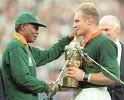What I didn’t necessarily expect was to be warmed by the city as much as I was—even if it required a few cold realizations.
On our first morning at the Christian Activities Center (CAC) in East St. Louis, Illinois (across the Mississippi from Missouri), Drew, Campbell alum and CAC chaplain, gave us a brief history lesson on East St. Louis.
Because I would probably get more kicks out of retelling the history than you would in hearing it (I’m a bit of a history geek), I’ll just sum it up for you.
 Nearly a century of race riots, unemployment, “white flight,” and underfunding has left East St. Louis (ESL) one of the poorest areas in the United States.
Nearly a century of race riots, unemployment, “white flight,” and underfunding has left East St. Louis (ESL) one of the poorest areas in the United States.Drew’s hope for our team that week was that we would experience life in ESL and go home “messed up” with a desire to mend similar situations in our own lives.
I’m usually a little skeptical of short-term mission trips. From what I’ve seen, “self–inflation” tends to be the more common result of such trips than is genuine change. But like Drew said, when a difficult situation can open your eyes to things previously unseen, the impact can last much longer than a week.
Before starting work at the CAC one afternoon, one of the young girls from the neighborhood led us in a prayer. After thanking God for her family and friends, the girl prayed, “be with our enemies and help us come together.”
 We are commanded to pray for our enemies in one of Jesus’ most well known sermons, yet we as a church so seldom actually do it. But here in one of the most underprivileged areas of the country is a 12-year old girl—who probably has more reason to have enemies than I do—doing what millions who share her faith regularly fail to do.
We are commanded to pray for our enemies in one of Jesus’ most well known sermons, yet we as a church so seldom actually do it. But here in one of the most underprivileged areas of the country is a 12-year old girl—who probably has more reason to have enemies than I do—doing what millions who share her faith regularly fail to do.That simple prayer really humbled me.
Among the other things that inspired me last week were some of the individuals on our own mission team. Every one of the 16 people from our group was so eager to serve, but perhaps none more than my friend Amber.
Amber was diagnosed with a rare type of cancer when she was in middle school. After attempting several treatment options, doctors determined that amputating her left leg would be the best course of action. Despite her seemingly disadvantageous position, Amber was absolutely the most optimistic, happy, and carefree person on our team.
 It would be easy for people like Amber or James (another member of our team who is deaf) to adopt a self-centered attitude and let their circumstances keep them from serving others. But, no, they each had an indomitable spirit and loved those around them the best way they knew how. This attitude was contagious. Each morning, friends like these face the new day by giving all that they have; that is more than I can usually say.
It would be easy for people like Amber or James (another member of our team who is deaf) to adopt a self-centered attitude and let their circumstances keep them from serving others. But, no, they each had an indomitable spirit and loved those around them the best way they knew how. This attitude was contagious. Each morning, friends like these face the new day by giving all that they have; that is more than I can usually say.These new friends have truly inspired me.
Several more eye-opening experiences would occur, but Thursday morning inevitably rolled around and it was time for us to head home. We packed our bags, headed east, and watched the Gateway Arch fade in the rear-view mirror. St. Louis really wasn’t any different of a city because of 16 college students who served there for a week.
But for at least one college student, the world now has a slightly brighter hue. Love now seems a little warmer, prayer, a little more vital, community, a little more important, and the gospel, a little more vivid.
 The mission field has taught me far more than I could have ever hoped to teach.
The mission field has taught me far more than I could have ever hoped to teach.God, let these experiences and those to come lead me to a fuller understanding of you and your love. Oh yeah, and be with my enemies so we can come together.









